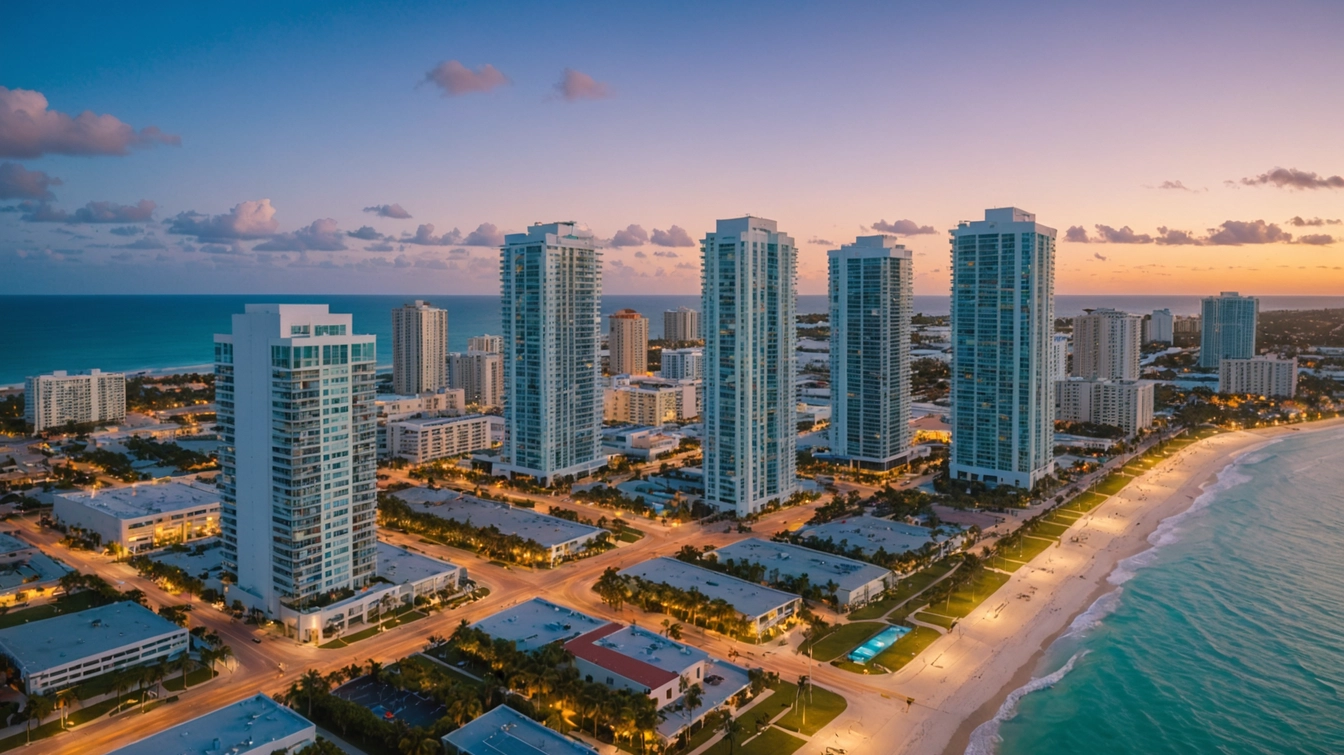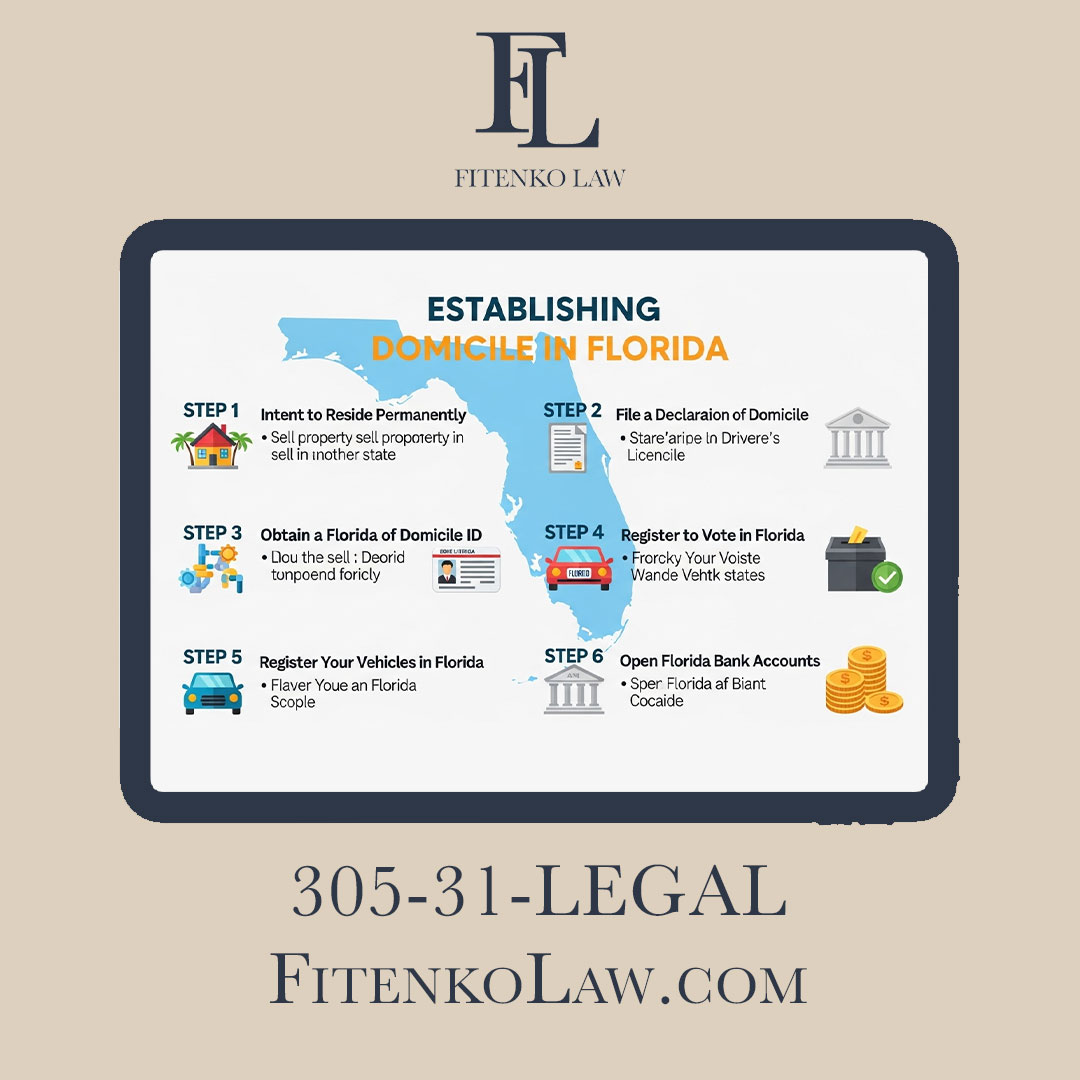Your Ultimate Guide to U.S. Immigration in South Florida
The decision to move to the United States represents a journey of ambition, opportunity, and hope. For countless professionals, investors, and families, South Florida is the destination of choice, offering a vibrant economy, an unparalleled lifestyle, and a welcoming international community. Cities like Hallandale Beach, Aventura, and Sunny Isles are at the epicenter of this growth, presenting a unique blend of cosmopolitan culture and serene coastal living. However, navigating the intricate and often intimidating landscape of U.S. immigration law can be a formidable challenge. A successful transition depends not just on your vision, but on expert legal guidance from a seasoned professional.
At Fitenko Law, a boutique firm based in the heart of Hallandale Beach, we provide the sophisticated legal counsel that international clients require. Our practice is built on a deep understanding of immigration law, seamlessly integrated with our expertise in real estate and estate planning. We don’t just file petitions; we build comprehensive, forward-thinking strategies that align with your long-term personal and financial goals. This guide will illuminate the primary pathways to U.S. residency and citizenship, demonstrating how our firm can be your trusted partner in this life-changing endeavor. For personalized advice tailored to your unique circumstances, we invite you to contact our office today.
Why Ambitious Individuals Choose South Florida
South Florida’s allure is undeniably magnetic. The region boasts a famously favorable tax environment with no state income tax, making it a financial haven for high-net-worth individuals and entrepreneurs looking to maximize their earnings. Its strategic location serves as the gateway to the Americas, fostering a robust international business climate that thrives on multicultural commerce. For our clients, this translates directly into access to burgeoning markets and boundless opportunities for growth. Communities like the beautiful Hallandale Beach offer the perfect blend of tranquil coastal living and dynamic urban energy, creating an ideal backdrop for both work and play.
Furthermore, the real estate market in areas such as Sunny Isles and Aventura presents exceptional and diverse investment opportunities. Many of our clients begin their U.S. journey by purchasing property, whether it is a luxurious oceanfront condominium, a family home in a gated community, or a commercial space for a new business venture. This crucial first step often intertwines with their overarching immigration strategy. Our firm’s integrated practice areas ensure that your real estate investments are structured to support, and even strengthen, your immigration objectives, providing a solid and secure foundation for your new life in Florida.
The Fitenko Law Integrated Approach: Beyond a Single Petition
We firmly believe that effective legal representation for new residents must be holistic and far-reaching. Your immigration status, financial standing, and personal legacy are all deeply interconnected. At Fitenko Law, we have meticulously built our firm around this core principle. While our primary focus may be on securing your visa or green card, our counsel extends to protecting your assets, navigating complex real estate transactions, and planning for your family’s future in a new country. This comprehensive support system, which addresses every facet of your relocation, is what truly sets us apart from other law firms.
For example, when we assist an investor with an E-2 visa, our work doesn’t stop at the petition’s approval. We also provide critical guidance on the legal aspects of purchasing a home and leasing a commercial space for their new business. Concurrently, our estate planning attorneys work with you to create wills, trusts, and other essential legal instruments that are valid under Florida law. These are optimized for your unique situation as an international client, addressing potential cross-border tax implications and ensuring your legacy is protected. This synergy ensures that every legal angle is covered, providing you with complete peace of mind.
Investment and Employment-Based Immigration: Pathways for Professionals
The United States actively seeks to attract talent, innovation, and capital from around the world. Consequently, several visa categories are designed specifically for investors, entrepreneurs, executives, and individuals with extraordinary abilities who can contribute to the U.S. economy. These pathways can be exceptionally complex, requiring meticulous documentation, substantial financial evidence, and a clear, strategically sound approach. Fitenko Law specializes in guiding clients through these sophisticated options, transforming ambitious business goals into tangible American realities.
The E-2 Treaty Investor Visa: Taking Control of Your U.S. Venture
The E-2 visa is an exceptionally popular non-immigrant option for citizens of countries that maintain a treaty of commerce and navigation with the United States. It allows an individual to enter and work inside of the U.S. based on a substantial investment in a U.S. business. One of the key advantages of the E-2 visa is that there is no specific minimum investment amount defined by statute. Instead, the investment must be “substantial” in relation to the cost of either establishing a new business from the ground up or purchasing an existing one. This flexibility makes it accessible to a wide range of entrepreneurs.
To qualify, the treaty investor must be coming to the U.S. to “develop and direct” the enterprise. This means you must have at least 50% ownership of the business or possess operational control through a senior managerial position. The business itself must be a real, operating commercial enterprise. Moreover, it cannot be “marginal,” meaning it must have the present or future capacity to generate significantly more income than just enough to provide a minimal living for the investor and their family. For instance, purchasing a boutique hotel in Hollywood, FL, or launching a targeted marketing firm in North Miami could both be viable E-2 ventures. Our attorneys provide localized insights for these unique markets.
Dissecting the E-2 Visa Requirements and Process
Securing an E-2 visa requires a meticulously prepared application package. The cornerstone of this package is a comprehensive five-year business plan, complete with detailed financial projections, a market analysis, and a staffing plan. You must also prove that the investment funds were obtained through lawful means (a “source of funds” report) and have been irrevocably committed to the business. The process typically involves several key stages:
- Business Formation and Investment: This involves forming a U.S. entity (like an LLC or Corporation), obtaining a Federal Employer Identification Number (EIN), opening a corporate bank account, and transferring and spending a significant portion of the investment funds on business expenses.
- Application Preparation: We work with you to compile all necessary documentation, including the business plan, leases, purchase agreements, bank statements, and extensive evidence proving the lawful source of your funds.
- Submission and Interview: The application is submitted to the appropriate U.S. consulate or embassy abroad. The final step is a consular interview where the investor must articulate their business plan and their intent to depart the U.S. upon termination of their E-2 status.
While the E-2 is technically a non-immigrant visa, it can be renewed indefinitely as long as the business continues to meet the requirements, making it a long-term solution for many. It also allows the investor’s spouse to apply for work authorization, granting them open market employment eligibility. For a thorough evaluation of your E-2 eligibility and strategy, schedule a consultation with our firm.
The L-1 Intracompany Transferee Visa: Expanding Your Global Business to the U.S.
The L-1 visa is a powerful and versatile tool for multinational companies seeking to transfer key personnel to a new or existing U.S. office. This visa permits a U.S. employer to transfer an executive, manager, or an employee with specialized knowledge from one of its affiliated foreign offices. To be eligible, the employee must have worked for the qualifying foreign company for at least one continuous year within the three years immediately preceding their admission to the U.S. This requirement ensures that the transferee has significant experience within the organization.
The L-1 visa is divided into two distinct categories:
- L-1A for Executives and Managers: This category is for high-level personnel who will have significant authority over the U.S. operation. It allows for a maximum stay of seven years. Crucially, the L-1A visa can provide a direct and often expedited path to a green card through the EB-1C employment-based preference category, which does not require the lengthy PERM labor certification process.
- L-1B for Employees with Specialized Knowledge: This is for employees who possess unique, advanced, or proprietary knowledge of the company’s products, services, research, systems, or management. It allows for a maximum stay of five years.
Establishing a “new office” in the U.S. under the L-1 category has its own specific set of rigorous requirements. The company must secure a physical premise for the business and submit a detailed business plan demonstrating the financial ability to support the operation and the employee for the first year. Our integrated real estate law services can be invaluable in this phase, assisting with lease negotiations and review. The immigration lawyers at Fitenko Law have extensive experience in structuring successful L-1 petitions for businesses of all sizes, from small enterprises to large corporations.
The EB-5 Immigrant Investor Program: A Direct Path to a Green Card
The EB-5 program stands as one of the most direct, albeit capital-intensive, ways for foreign investors to obtain a U.S. green card for themselves and their immediate family (spouse and unmarried children under 21). The program requires a significant capital investment into a new commercial enterprise that creates at least 10 full-time jobs for qualifying U.S. workers. This pathway is extraordinarily complex and requires immaculate, detailed documentation, particularly regarding the lawful source and path of the investment funds.
As of 2025, the required investment amounts are set at:
- $1,050,000 in a standard investment project.
- $800,000 if the investment is made in a Targeted Employment Area (TEA), which is defined as a rural area or an area experiencing high unemployment. Many projects in developing areas of Florida may qualify for the lower amount.
Investors can choose one of two main paths. The first is a “direct investment,” where they start their own business and are directly responsible for managing it and creating the 10 jobs. The second, more common path is investing through a USCIS-approved “Regional Center.” This model allows for a more passive investment role and uses more flexible economic models to calculate job creation (including indirect and induced jobs). The EB-5 journey involves filing an initial Petition (I-526E) to obtain a two-year conditional green card, followed by a second Petition (I-829) to remove those conditions and receive permanent residency. Given the high financial stakes and legal complexity, professional legal counsel from a firm like Fitenko Law is non-negotiable for success.
Visas for Exceptional Talent: The O-1 and EB-1A Pathways
Beyond traditional investment and employment routes, the U.S. offers special pathways for individuals who are at the very top of their fields. South Florida, as a global hub for the arts, entertainment, sciences, and international business, is a natural destination for such talent. The O-1 non-immigrant visa and the EB-1A immigrant visa are designed for these “extraordinary ability” individuals, offering unique opportunities for those who can demonstrate sustained national or international acclaim. These cases are highly subjective and demand a sophisticated presentation of evidence.
The O-1 Visa: For Individuals with Extraordinary Ability or Achievement
The O-1 visa is for individuals who possess extraordinary ability in the sciences, arts, education, business, or athletics, or who have a demonstrated record of extraordinary achievement in the motion picture or television industry. Unlike other work visas, the O-1 does not require a specific educational degree. Instead, the focus is entirely on the applicant’s achievements. For example, an acclaimed DJ performing at Miami Music Week, a renowned scientist joining a research institute, or a celebrated artist exhibiting at Art Basel could all be candidates for an O-1 visa.
To qualify, the applicant must provide evidence that they meet at least three of a list of specific criteria, which may include:
- Receipt of nationally or internationally recognized prizes or awards.
- Membership in associations in the field which require outstanding achievements of their members.
- Published material about the applicant in professional or major trade publications.
- Evidence of the applicant’s original scientific, scholarly, artistic, athletic, or business-related contributions of major significance.
- Evidence of having commanded a high salary or other significantly high remuneration.
An O-1 visa requires a U.S. employer, agent, or sponsor to file the petition on the individual’s behalf. Our firm often works with talented individuals to secure a suitable petitioner and build a compelling case that clearly showcases their extraordinary talents to USCIS.
The EB-1A Green Card: Extraordinary Ability as a Direct Path to Residency
The EB-1A (or EB-1 for Extraordinary Ability) is the immigrant-level counterpart to the O-1 visa and is one of the most desirable green card categories. It allows individuals with extraordinary ability to obtain permanent residency without the need for a job offer or a labor certification (PERM). This means an individual can self-petition, offering a level of independence and control not found in most other employment-based green card paths. The standard for an EB-1A petition is significantly higher than for an O-1 visa; the applicant must demonstrate that they have risen to the very small percentage at the top of their field.
The evidence required is similar to the O-1 visa but must be more extensive and demonstrate sustained acclaim and that the applicant’s work will be of substantial prospective benefit to the United States. Successfully petitioning for an EB-1A requires a masterful narrative, weaving together evidence to create a portrait of a truly exceptional individual. Our immigration attorneys possess the experience to craft these sophisticated petitions, helping the world’s best and brightest make their permanent home in South Florida.
Family-Based Immigration: Uniting Families in the United States
The U.S. immigration system, at its core, places a strong emphasis on family unity. It provides several well-defined avenues for U.S. citizens and Lawful Permanent Residents (LPRs or “green card holders”) to sponsor their relatives for a green card. The process, eligibility, and wait times, however, can vary dramatically based on the sponsor’s immigration status and their specific relationship to the beneficiary. At Fitenko Law, we handle these sensitive and often emotional cases with the compassion, diligence, and meticulous attention to detail they deserve, helping families navigate the path to reunification in South Florida.
Sponsorship by U.S. Citizens: The Broadest Scope
U.S. citizens have the most extensive ability to sponsor relatives for immigration. The law makes a critical distinction between “immediate relatives” and other family members who fall into “family preference categories.”
Immediate Relatives: This is the most favored category and is not subject to any annual numerical limits or quotas. This means there is no prolonged waiting period for a visa number to become available once the initial petition is approved. This category includes:
- Spouses of U.S. citizens.
- Unmarried children under the age of 21 of U.S. citizens.
- Parents of U.S. citizens, provided the citizen sponsor is at least 21 years old.
For immediate relatives, the process begins with filing Form I-130, Petition for Alien Relative. After its approval, the case proceeds to either adjustment of status (if the relative is already in the U.S. legally) or consular processing at a U.S. embassy abroad. The entire process can often be completed within one to two years.
Understanding the Family Preference Categories
For other, more distant relatives, the process is governed by a preference system with strict annual quotas, which unfortunately results in significant wait times. The length of the wait depends on the preference category, the beneficiary’s country of chargeability, and the date the I-130 petition was filed (the “priority date”). These categories include:
- First Preference (F1): Unmarried sons and daughters (21 years of age and older) of U.S. citizens.
- Third Preference (F3): Married sons and daughters (of any age) of U.S. citizens.
- Fourth Preference (F4): Brothers and sisters of U.S. citizens (if the U.S. citizen is 21 years of age and older).
The wait times for these categories can range from several years to, in some cases, over two decades. Our legal team helps clients understand the State Department’s monthly Visa Bulletin to track their place in line and provide realistic timeline expectations. You can review the official process on the USCIS website, but navigating it effectively requires professional guidance.
Sponsorship by Lawful Permanent Residents (Green Card Holders)
Lawful Permanent Residents (LPRs) can also sponsor certain close family members, although their options are more limited than those available to U.S. citizens. An LPR can file a petition for:
- Second Preference (F2A): Spouses and unmarried children (under 21 years of age).
- Second Preference (F2B): Unmarried sons and daughters (21 years of age and older).
Both of these categories are subject to annual visa caps, meaning there is typically a waiting period before the sponsored relative can immigrate. The wait for the F2A category is often shorter than for F2B. A crucial strategic point arises if the LPR sponsor becomes a U.S. citizen while the petition is pending. In most cases, the petition can be automatically upgraded to a higher-priority category (like Immediate Relative or F1), which can dramatically shorten the remaining wait time. We advise our clients on the benefits and timing of naturalization as part of a comprehensive family immigration strategy. For more legal insights, please visit our law blog.
Navigating Complex Immigration Challenges
The path to U.S. immigration is not always a straight line. Complications can arise, from past visa overstays to unforeseen legal issues. In these moments, the skill and experience of your immigration attorney are paramount. A boutique firm like Fitenko Law excels in handling these high-stakes, nuanced cases. We provide robust defense for those facing removal and creative solutions for those who require waivers to overcome grounds of inadmissibility. Our goal is to protect your ability to remain with your family and continue your life in the United States.
Deportation and Removal Defense: Protecting Your Right to Remain
Being placed in removal proceedings is one of the most stressful experiences an individual or family can face. This formal process, which takes place in immigration court, determines whether a foreign national will be ordered deported from the U.S. A person can be placed in removal for a variety of reasons, including committing certain crimes, violating the terms of their visa, or being present in the U.S. without authorization.
An effective removal defense requires a deep knowledge of immigration law and courtroom procedure. Our attorneys meticulously analyze each case to identify all available forms of relief. This may include:
- Cancellation of Removal: A discretionary form of relief for certain permanent and non-permanent residents who meet strict residency and character requirements.
- Asylum, Withholding of Removal, and Protection under the Convention Against Torture: For individuals who fear persecution or torture if returned to their home country.
- Adjustment of Status: In some cases, it’s possible to apply for a green card before the immigration judge.
- Prosecutorial Discretion: Persuading the government’s attorney to administratively close or dismiss the case.
Navigating the immigration court system without expert representation is fraught with peril. We provide the aggressive defense and strategic counsel needed to secure the best possible outcome.
Waivers of Inadmissibility: Overcoming Barriers to Your Visa or Green Card
Many immigration applications are denied because the applicant is found to be “inadmissible” to the United States. Grounds of inadmissibility are numerous and can include prior immigration violations (like unlawful presence), criminal convictions, fraud or misrepresentation, and certain health-related issues. However, the law provides a remedy in many cases: a waiver. A waiver is essentially a legal pardon that asks the government to forgive the underlying ground of inadmissibility.
The most common type of waiver is the I-601 Waiver, often based on proving that a U.S. citizen or permanent resident qualifying relative would suffer “extreme hardship” if the applicant were denied the visa or green card. Proving extreme hardship is a high legal standard. It requires extensive documentation covering financial, emotional, medical, and social factors. Our firm specializes in preparing detailed, persuasive waiver applications that tell a compelling human story, backed by concrete evidence, to give our clients the best chance of success.
Special Considerations for International Clients in Florida
For international clients, relocating to Florida involves more than just immigration paperwork. It means navigating a new financial and legal system. The interplay between U.S. tax law, real estate regulations, and estate planning principles can be particularly complex for foreign nationals. At Fitenko Law, our integrated practice areas are designed to address these cross-border challenges, providing a seamless experience for investors and new residents.
Real Estate Transactions and FIRPTA
When a foreign person sells U.S. real estate, the transaction is subject to the Foreign Investment in Real Property Tax Act (FIRPTA). Under FIRPTA, the IRS requires the buyer to withhold a percentage of the gross sales price (typically 15%) to ensure that any capital gains tax owed by the foreign seller is paid. This can come as a major surprise to sellers, tying up a significant portion of their proceeds. However, proper legal planning can mitigate this issue. Our real estate law team can assist in applying for a withholding certificate from the IRS to reduce or eliminate the required withholding amount before the closing. This proactive step ensures our international clients retain maximum liquidity from their property sales.
Cross-Border Estate Planning for a Global Lifestyle
New residents from other countries often arrive with a global asset portfolio and complex family situations. A simple domestic estate plan is rarely sufficient. Our estate planning attorneys specialize in creating sophisticated cross-border plans. We consider U.S. estate and gift tax laws as they apply to non-citizens, the impact of international tax treaties, and the inheritance laws of other countries. We use tools like qualified domestic trusts (QDOTs) to preserve the marital deduction for non-citizen spouses and advise on how to structure ownership of foreign assets to avoid double taxation and ensure a smooth transfer of wealth to the next generation. This level of integrated planning is essential for protecting your global legacy.
The Final Step: The Path to U.S. Citizenship Through Naturalization
For most immigrants, the ultimate aspiration of their journey is to become a U.S. citizen. Citizenship grants the full rights and privileges of being an American, including the right to vote in federal elections, hold a U.S. passport for international travel, and hold certain federal jobs. The process of becoming a citizen after obtaining a green card is called naturalization. While it is a well-defined process, it requires strict adherence to a set of legal and residency criteria, and any misstep can lead to delays or even denial.
Dissecting the Key Eligibility Requirements for Naturalization
To be eligible to file Form N-400, Application for Naturalization, an applicant must generally meet the following requirements:
- Permanent Residency Status: You must have been a lawful permanent resident for at least five years. This is reduced to three years if you have been married to and living with the same U.S. citizen spouse for that entire period.
- Continuous Residence: You must have resided continuously in the U.S. for the required period just before filing. An absence from the U.S. of six months or more can potentially disrupt this continuity and reset the clock.
- Physical Presence: You must have been physically present in the U.S. for at least half of your required residency period—that is, 30 months out of five years, or 18 months out of three years.
- Good Moral Character: You must demonstrate that you have been a person of good moral character for the statutory period. A wide range of issues, from certain criminal convictions to failure to pay taxes or child support, can negatively impact this finding.
- Civics and English Proficiency: You must pass a test on U.S. history and government and demonstrate a basic ability to read, write, and speak English, with some age-based exceptions.
The naturalization journey culminates in an in-person interview with a USCIS officer, who will verify the information on your application and administer the tests. Upon approval, the final step is attending an Oath of Allegiance ceremony, where you will officially become a citizen. The attorneys at Fitenko Law provide comprehensive preparation for the N-400 application and interview, ensuring our clients approach this final, critical step with preparation and confidence.
Why Choose Fitenko Law as Your Immigration Counsel in Hallandale Beach?
Choosing the right attorney is arguably the most critical decision you will make in your entire immigration journey. Your choice will directly impact the outcome of your case, the smoothness of the process, and your peace of mind. Fitenko Law stands apart as the premier choice for discerning clients in South Florida because we have built our firm to address the complete needs of the modern immigrant, investor, and professional.
Our comprehensive expertise across a wide range of immigration matters—from high-stakes investor visas and extraordinary ability petitions to complex removal defense and sensitive family cases—ensures we are equipped for any challenge. We don’t just see a single petition; we see the entire picture of your life and goals. This perspective is what allows us to provide truly strategic advice.
What truly distinguishes us is our seamless integration of this deep immigration knowledge with our robust practices in real estate and estate planning. We understand the specific challenges you face, from FIRPTA withholding on your property sale to the complexities of creating a will as a non-citizen. This integrated model eliminates the gaps and inefficiencies that occur when working with multiple, disconnected law firms. With Fitenko Law, you have a single, cohesive team dedicated to every aspect of your new life in Florida.
Your American dream deserves the highest caliber of legal advocacy and strategic thought. From our office in Hallandale Beach, we have helped countless individuals and families successfully plant their roots in the Sunshine State. We are ready and eager to do the same for you. We encourage you to explore our website to learn more about our philosophy and our team. When you are ready to begin the conversation about your future, contact Fitenko Law to schedule a confidential and comprehensive consultation. Let us build your future in Florida, together.






